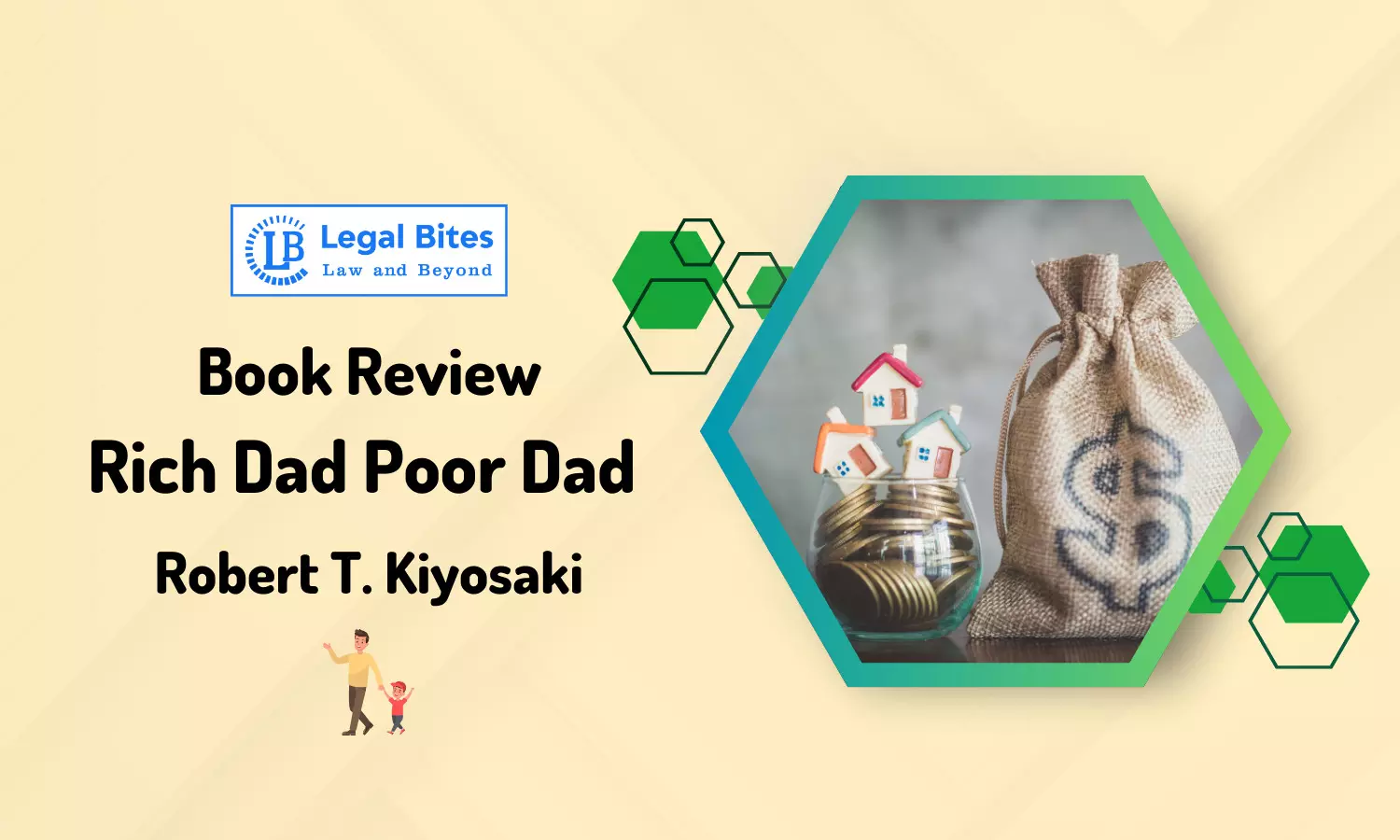Book Review: Rich Dad Poor Dad | Robert T. Kiyosaki
The book review emphasizes the importance of financial education, investing, and building wealth through assets.

'Rich Dad Poor Dad' by Robert Kiyosaki is primarily about contrasting the financial teachings and perspectives of two father figures, offering valuable lessons on wealth creation and mindset.
- Name of the Book: Rich Dad Poor Dad
- Year: 1997
- Written by: Robert T. Kiyosaki
- Themes: Financial Literacy, Education, and Independence
- Buy it on Amazon Here: Rich Dad Poor Dad
This masterpiece book guides us through the realms of money and wealth, with its twin stars representing 'Rich Dad' and 'Poor Dad'.
Kiyosaki’s biological father, a very intelligent well-educated guy was the poor impoverished fellow. The impoverished father thought that if one studied very hard and obtained the highest marks and grades, would subsequently secure a well-paying job. However, despite having such advantageous qualities, poor dad was only able to earn a handful of money and unable to make his family comfortable.
Robert’s greatest buddy, Rich Dad was his father. He held a similar work ethic and enthusiasm as his biological father but with a plot twist. The rich one was very strong in financial literacy, knowing in and out of managing money and how to make it work for you. Regardless of being a dropout from the eighth grade, his knowledge and power of money, made him the millionaire
The book is written from Kiyosaki’s point of view, detailing the mistakes and risk-less behaviour made by Poor Dad and how Rich Dad went about becoming wealthy. About, two-thirds of Rich Dad Poor Dad is devoted to discussing the six lessons that Kiyosaki took away from his rich father in the first six Lessons, the lesson learnt, of the book.
Lesson Number 1: The Rich Don't Work For Money
One of the most common misinterpretations of this Lesson’s title is that it implies that the wealthy are lazy. It’s the quite opposite.
What Kiyosaki intends to convey is that rather than viewing the Lesson title as ‘The Rich One, Don’t Work for Money.’ It should be noted that this portion has a completely different connotation because of the emphasis placed on the word ‘money.’
In actuality, most wealthy individuals put in a lot of labour, but they approach it differently than other people. Individuals who are wealthy or aspire to be wealthy work hard and acquire the skill of managing their finances daily. The impoverished and middle-class labour for profit, as Rich Dad puts it. The wealthy employ money workers.
Lesson Number 2: Why Teach Financial Literacy?
In Rich Dad Poor Dad’s second Lesson, the distinction between an asset and a liability is explained. The message that matters most in Lesson 2 is that your take-home pay, which is what you keep after expenses, is more important than your income.
Anything that has worth generates income or increases in value, and has a market where it can readily be purchased and sold is considered an asset:
- Assets generate revenue.
- Assets increase their value
- Asserts generate revenue and increase its value
Liabilities, on the other hand, cost you money because of the accompanying expenses. This claim made by Kiyosaki in his 1997 book Rich Dad Poor Dad caused a great deal of debate.
This is thus because, by definition, a personal home isn’t considered an asset until its appreciation outweighs the expenses associated with ownership. However, rental property is an asset as it may bring in enough cash flow from passive sources to cover the costs of financing and maintaining the real estate.
Lesson Number 3: Mind Your Own Business
This lesson has two main points.
- Pay off your obligations first, then as soon as you can, begin investing in assets that will provide income.
- Next, maintain your financial well-being by allocating as much of your income to assets and spending your time rather than your salary.
In Lesson 3 of Rich Dad Poor Dad, Kiyosaki observes that most individuals mistakenly identify their business with their vocation. Put another way, they work in someone else’s company all their lives, creating wealth for others.
Lesson Number 4: The History of Taxes and the Power of Corporation
It’s crucial to remember that Kiyosaki did not write Rich Dad Poor Dad to offer professional financial or tax advice; rather, he created it as a motivating book for readers to follow.
For instance, Kiyosaki describes using pre-tax money to purchase a Porsche, which he characterised as a company cost. Purchasing an upscale luxury vehicle when a far less costly brand and model will do might quickly lead an investor to an IRS examination.
Nevertheless, leaving Porsche aside, this Lesson’s arguments focus on how to make wise investing decisions. The wealthy employ all available legal methods to reduce their tax liability because they are aware of the impact that corporate structures and the tax law may have.
Contrast the typical taxpayer’s tax payment method with that of company owners and investors that use companies, such as C corps, S corps, or LLCs:
Entrepreneurs who have a corporate structure:
- Earn, Spend, and Pay Taxes
- Workers for Corporations:
- Earn, taxes, Pay, Spend
You’ll see that although business owners make and spend money before paying taxes, workers who work for someone else spend their money after taxes.
The four primary facets of what Kiyosaki refers to as ‘Financial IQ’—Accounting, Investment Strategy, Market Law, and Law—are also covered in Lesson 4 of the book.
Building long-term wealth greatly depends on realising the legal and tax benefits, as Rich Dad Poor Dad reminds us.
Lesson 5: The Rich Invent Money
Finding chances or transactions that other individuals don’t have the expertise, resources, contacts, or skills for is the essence of inventing money.
There are two categories of investors, as Rich Dad Poor Dad outlines in Lesson 5:
(I) Those who trust a fund manager or developer with their money purchase investment packages. Purchasing shares of an ETF or sponsoring a real estate crowdfunding project are examples of how most people invest.
(II) Professional investors take care of their investments, scour the market for transactions that make sense, and then employ experts to handle day-to-day management.
Three characteristics are shared by experienced investors:
(i) Find possibilities that others have overlooked
(ii) Gather money for investments.
(iii) Collaborate with other bright individuals
Lesson 6: Work to Learn - Don't Work For Money
The poor dad was smart and intellectual but unfortunately worked for money. 'Job Security' meant the world to him. The Rich Dad, however, became a millionaire and focused on learning rather than earning
That’s just what Kiyosaki accomplished. After earning his undergraduate degree, he enlisted in the Marines, where he acquired crucial leadership and personnel management abilities. Following his military service, Kiyosaki joined Xerox, conquered his fear of rejection to become among the firm’s top 5 salesmen, and then left the corporate world to start his own company.
Rich Dad’s Lesson 6 Next, Poor Dad talks about the combination of managerial abilities required for commercial success:
1. Management of Cash Flow
2. System Administration
3. Human Resource Management
Lesson Number 7: Overcoming Obstacle
(Kiyosaki) The kind of anxiety, the kind of tension that some individuals experience while visiting the dentist or viewing The Exorcist is not something Robert Kiyosaki discusses. The dread of losing money is the subject of the book’s Lesson on ‘fear’ and how to deal with it.
It’s among the top 5 challenges individuals encounter while trying to achieve financial independence:
- Fear,
- Cynicism,
- Laziness,
- Bad Habits and
- Arrogance
Even those who have studied and attained financial literacy cannot create assets that produce copious quantities of cash flow because of these obstacles and their inability to get past them.
Lesson 8: Getting Started
Provides practical steps and mindset shifts needed to begin the journey toward financial independence.
Conclusion
Rich Dad Poor Dad, the book aims to inspire you to carve yourself a special route to financial independence.
Although the book doesn’t offer a one-size-fits-all solution with pre-made solutions, it offers a great foundation for setting your goals to increase your wealth through real estate investing.
As we say goodbye to the comic travel of ‘Rich Dad Poor Dad', enlightened by the stars and celestial bodies, let us chart our newfound zeal within the self, harnessing the knowledge, boldness and discipline to structure our very own constellations of prosperity in the vast universe.

